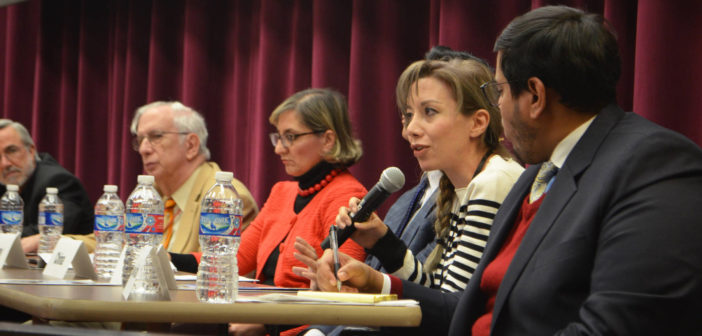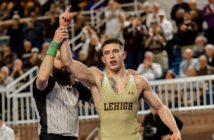Five United Nations foreign correspondents visited Lehigh on Oct. 26 to speak about foreign perspectives of the upcoming U.S. presidential election. The correspondents touched on many topics revolving around this year’s election and gave responses on behalf of their respective countries.
The purpose of the panel was to show Lehigh students how the world is watching the U.S. election and how deeply invested foreign nations are on the outcome of it.
Bill Hunter, the director of fellowship advising and UN programs, recognized firsthand the popularity of the U.S. election around the world.
“I was in a remote village in Antigua earlier this summer and a sixth grader just comes up to me and says, ‘Trump’ — just one word,” Hunter said. “To the point where a sixth grader in a village in Antigua is focused on the American election is significant. I think it shows the full ramifications of the interest around the world.”
Hunter, who is the primary representative in the partnership between Lehigh and the UN, helped secure the correspondents who spoke on the panel. On the panel was Bingxin Li from China, the chief correspondent of People’s Daily UN Bureau; Anna Balotsky of Armenia, who works for Armenian and Russian publications; Sema Emiroglu of Turkey, who is an award-winning journalist, author and researcher; George Baumgarten, the UN correspondent for the North American Jewish media and East Africa; and Hadi Affakeeh, a writer for the Makkah newspaper in Saudi Arabia.
Video by Nadine Elsayed
Jack Lule, the chair of the journalism and communications department, and Saladin Ambar, the chair of the political science department and an associate professor, moderated the panel.
The event started with a brief opening statement from each of the five guests, who introduced themselves and outlined some of the issues in this upcoming election that their respective countries weigh most heavily.
The correspondents said each country represented had positive and negative thoughts about both of the candidates. Saudi Arabia and Turkey had a stronger connection with Democratic nominee Hilary Clinton due largely to some of Republican nominee Donald Trump’s stifling comments about Muslims.
Russia has taken alternating positions on which candidate its general public prefers. At the beginning of the election, many Russians supported Clinton. However, public opinion in Russia has recently shifted toward Trump largely due to Clinton’s comments about Russian hackers influencing the election.
In China, views are predominantly split between Trump and Clinton. People like Clinton because China has had a long relationship with them during her years as secretary of state, and people like Trump because of the large amount of business deals he has done with Chinese citizens. They are worried about Trump’s proposals to add a tax on Chinese imports.
North-American Jews have historically voted Democratic, and the east African countries support Clinton because of her strong relationship with President Barack Obama, Baumgarten said.
Members of the audience also had the opportunity to ask questions to people on the panel. Topics of discussion ranged from comparisons of this election to past ones, America acting as the world police force and issues surrounding the candidates.
Students saw the event as an opportunity to see how our presidential election affects people around the world. Jigar Patel, ’17, said it was an eye-opening experience that shed light on the foreign perspectives of our election.
“I was surprised by how (the foreign correspondents) were saying more compromise — be more cooperative, and how it hasn’t been happening before and how it’s still not happening,” Patel said. “That’s one of the biggest hurdles currently.”
Soraya Todd, ’17, the Lehigh and UN partnership intern, said the overall outcome of the event was positive. Todd spent the past few weeks working with Hunter to plan the event.
“To come to a college campus is really exciting for (the correspondents) because it really gives them the opportunity to interact with people our age who are voting for probably the first time and it teaches us things about the election,” Todd said. “But it also teaches these journalists how young minds think and what their opinions are compared to their own. It allows them to take these insights back into their own countries and see what can be learned from that.”
Hunter said this type of event is uncommon and it is the only event like this that happens throughout the country. This was the second time it was held at Lehigh. The first time was eight years ago during the 2008 Obama and McCain election.






Comment policy
Comments posted to The Brown and White website are reviewed by a moderator before being approved. Incendiary speech or harassing language, including comments targeted at individuals, may be deemed unacceptable and not published. Spam and other soliciting will also be declined.
The Brown and White also reserves the right to not publish entirely anonymous comments.